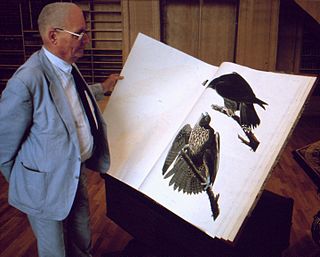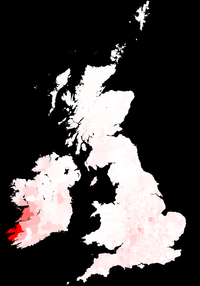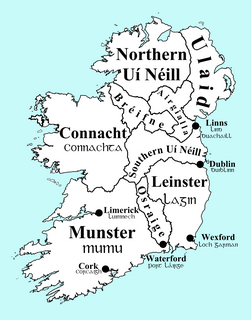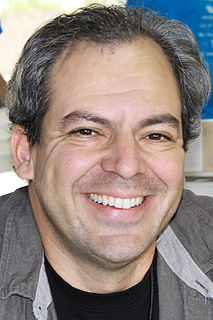This page is based on this
Wikipedia article Text is available under the
CC BY-SA 4.0 license; additional terms may apply.
Images, videos and audio are available under their respective licenses.

Clark is an English language surname, ultimately derived from the Latin clericus meaning "scribe", "secretary" or a scholar within a religious order, referring to someone who was educated. Clark evolved from "clerk". First records of the name are found in 12th-century England. The name has many variants.
Lee is a common surname in English-speaking countries.
Pérez or Perez, as most commonly written in English, is a Spanish and Jewish surname popular among people of Sephardic Jewish descent.

Jean Dorst was a French ornithologist.

Tankred Dorst was a German playwright and storyteller.
Schmidt is a common German occupational surname derived from the German word "Schmied" meaning "blacksmith" and/or "metalworker". This surname is the German equivalent of "Smith" in the English-speaking world.
Quinn is an Anglicised form of the Irish Ó Coinn. The latter surname means "descendant of Conn". The surname Quinn is also rendered Ó Cuinn in Irish. The surname is borne by numerous unrelated Irish families in Ulster and the Irish counties of Clare, Longford, and Mayo. The most notable family of the name are that of Thomond, a Dalcassian sept, who derive their surname from Niall Ó Cuinn who was slain at the Battle of Clontarf in 1014. This family was formerly represented by the Earls of Dunraven. Another family is that seated in Annaly, who were related to the O'Farrell lords of Longford. Other families include one seated in Antrim; one seated in Raphoe; and one called Clann Cuain, seated near Castlebar. In the seventeenth century, the surname Quinn was common in Waterford. In 1890, the surname was numerous in Dublin, Tyrone, Antrim, and Roscommon. Quinn is one of the twenty most common surnames in Ireland. It is sometimes said that the surname Quinn is borne by Catholics whilst Quin is borne by Protestants.
Brian is a male given name of Irish and Breton origin, as well as a surname of Occitan origin. It is common in the English-speaking world. It is possible that the name is derived from an Old Celtic word meaning "high" or "noble". For example, the element bre means "hill"; which could be transferred to mean "eminence" or "exalted one". The name is quite popular in Ireland, on account of Brian Boru, a 10th-century High King of Ireland. The name was also quite popular in East Anglia during the Middle Ages. This is because the name was introduced to England by Bretons following the Norman Conquest. Bretons also settled in Ireland along with the Normans in the 12th century, and 'their' name was mingled with the 'Irish' version. Also, in the north-west of England, the 'Irish' name was introduced by Scandinavian settlers from Ireland. Within the Gaelic speaking areas of Scotland, the name was at first only used by professional families of Irish origin. It was the fourth most popular male name in England and Wales in 1934, but a sharp decline followed over the remainder of the 20th century and by 1994 it had fallen out of the top 100. It retained its popularity in the United States for longer; its most popular period there was from 1968–1979 when it consistently ranked between eighth and tenth. The name has become increasingly popular in South America - particularly Argentina and Uruguay since the early 1990s.

Griffin is a surname of primarily Irish origin. Griffin was the 75th most common surname on the island of Ireland in 1891. It was estimated in 2000 that Griffin is the 114th most common surname in the U.S., with a population in the order of two hundred thousand.
Folk or Folks may refer to:
The surname McArdle or MacArdle was the twelfth most numerous in its homeland of County Monaghan in 1970. The surname in Irish is MacArdghail, from ardghal, meaning 'high valour' or from the Irish "ardghail" meaning "tall foreigner" with roots "ard" meaning "tall" and "gail" meaning "foreigner" indicative of their original ancestor being a Viking or from Viking stock. The surname is also common in County Armagh and County Louth.
Tyler is an English name derived from the Old French tieuleor, tieulier and the Middle English tyler, tylere. The name was originally an occupational name for one who makes or lays tiles. It is used both as a surname, and as given name for both sexes. Among the earliest recorded uses of the surname is from the 14th century: Wat Tyler of Kent, South East England.

Martin may either be a surname or given name. Martin is a common given and family name in many languages and cultures. It comes from the Latin name Martinus, which is a late derived form of the name of the Roman god Mars, the protective godhead of the Latins, and therefore the god of war. The meaning is usually rendered in reference to the god as "of Mars", or "of war/warlike" ("martial").

Kelly is a surname in the English language. The name has numerous origins. In some cases it is derived from toponyms located in Ireland and Great Britain, in other cases it is derived from patronyms in the Irish language.
Durst is a surname of German origin, and may refer to:
Marybeth Linzmeier Dorst, née Marybeth Linzmeier, is an American former competition swimmer who represented the United States at the Pan American Games and World University Games in the early 1980s.
Clarke is an Anglo-Irish surname which means "clerk". The surname is of English and Irish origin but the original word comes from Latin for clericus. There are some surname variants, including the Clerk and Clark which predates Clarke by over 700 years. Clarke is also uncommonly chosen as a given name.

The 1976 NCAA Men's Water Polo Championship was the eighth annual tournament to determine the national champion of NCAA men's college water polo. Tournament matches were played at the Belmont Plaza Pool in Long Beach, California during December 1976.








